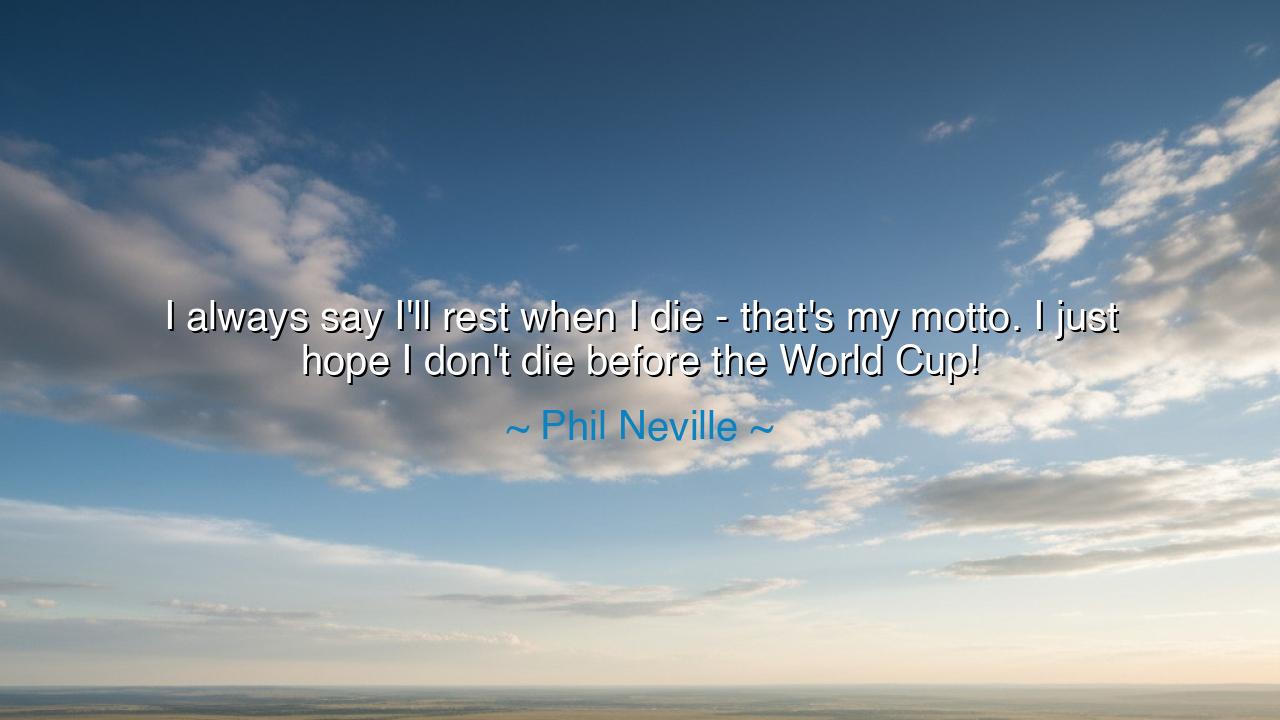
I always say I'll rest when I die - that's my motto. I just hope
I always say I'll rest when I die - that's my motto. I just hope I don't die before the World Cup!






In the spirited words of Phil Neville, the footballer and coach whose life has been a testament to relentless discipline, there lies a motto both humorous and profound: “I always say I’ll rest when I die – that’s my motto. I just hope I don’t die before the World Cup!” These words, though spoken with lightness, contain the fire of dedication, the heart of endurance, and the truth of a man who believes that life’s greatest calling is not to rest, but to strive. Beneath the laughter of his tone, there echoes an ancient creed — that greatness is not born of ease, but of unceasing effort, and that to live fully is to pour oneself entirely into the work one loves.
The origin of this quote arises from Neville’s devotion to his craft — a career defined not by flashes of glory alone, but by the constant labor that made him one of England’s most respected professionals. Known for his tireless ethic, his leadership, and his humility, Neville spoke these words as both jest and truth. In the world of sport, where every match is a test of body and spirit, his declaration is the anthem of all who refuse to surrender to fatigue. “I’ll rest when I die” is not a denial of exhaustion — it is the cry of the warrior soul, one who finds meaning in the struggle and joy in the striving.
To say, “I just hope I don’t die before the World Cup,” is to reveal both humor and humanity. It is a reminder that even the most devoted laborer dreams of witnessing the fruits of his toil. For Neville, the World Cup represents not merely a tournament, but the summit of a lifetime’s journey — the moment when years of sacrifice meet the light of fulfillment. Yet, there is also an acceptance in his words: that rest, when it comes, will come naturally — after the work is done, after the mission is complete. It is a sentiment that echoes the wisdom of the ancients, who taught that the noble man does not seek rest in the midst of battle, but only when the fight has been won.
This spirit can be seen throughout history in those who gave their entire being to their purpose. Consider Leonidas of Sparta, who led his three hundred warriors to Thermopylae. When the Persian horde demanded that they lay down their arms, Leonidas replied, “Come and take them.” He did not rest when weary, nor retreat when outnumbered — for his rest, like Neville’s, lay not in comfort but in completion. He fought until the last, finding glory in the struggle itself. The same fire burns in every soul who dedicates their life to something greater than ease — whether it be a soldier, an artist, a teacher, or an athlete.
Neville’s words also speak to a deeper truth about purpose and mortality. To live always seeking rest is to live half-dead; to live in purpose is to transcend the fear of death itself. For those who love what they do, labor becomes a form of worship — the field becomes a temple, the effort a prayer. When a man says, “I’ll rest when I die,” he is not mocking life; he is celebrating it. He declares that the measure of his days shall not be counted in hours of leisure, but in acts of passion, creation, and contribution. He does not flee from exhaustion, for he knows that tiredness is the mark of those who have truly lived.
Yet, there is wisdom, too, in his humor. By laughing at the closeness of death, Neville reminds us not to take life with grim severity. His jest — that he simply hopes not to die before the World Cup — teaches the balance between seriousness of purpose and the joy of the journey. Even the most disciplined heart must make room for laughter, for joy is the companion of endurance. Without it, ambition turns bitter, and striving becomes slavery. In his words, we hear the laughter of a man who works fiercely, but who never forgets that life itself is the greatest game — meant to be played with love, courage, and delight.
The lesson, then, is clear: live with such passion that rest becomes unnecessary until your purpose is fulfilled. Do not wait for perfect moments of ease before you begin; life’s glory is found in the midst of the struggle. Work with devotion, but do not forget to smile; pursue excellence, but remember to cherish the journey. Let your efforts be so wholehearted that when the time for rest finally comes — when death itself arrives — it finds you not idle or regretful, but radiant and complete.
So, my children of the living earth, learn from Phil Neville’s spirited wisdom: do not chase comfort; chase meaning. Let your life be a match well played, your heart the field upon which courage triumphs over fatigue. Work until your dreams take form; love until laughter becomes your rest. And when death comes, let it find you like a champion at the final whistle — worn, joyful, and unafraid. For those who live with such fire, even death must bow its head in respect.






AAdministratorAdministrator
Welcome, honored guests. Please leave a comment, we will respond soon